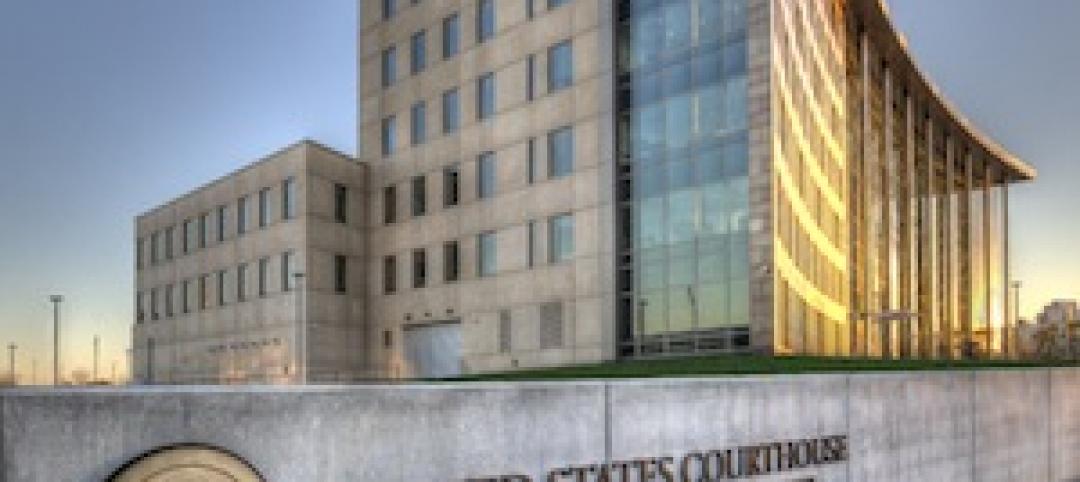
The Robert F. Kennedy Main Justice Building houses the U.S. Attorney General's office, the Justice Department headquarters, and the largest historic art collection of any GSA-built facility, so its renovation had to be performed with the utmost care.
 |
| The building’s art collection required the services of a full-time art conservator and a special “art protection package” for subcontractor bidding. PHOTO: BORIS FELDBLYUM PHOTOGRAPHY |
Offices housing hundreds of lawyers and staff had to remain operational during the construction of a brand new $3.1 million conference center and data room, the restoration of the main library and executive suites, and the installation of a new M/E/P system. All this had to be done while maintaining the highest levels of security and dealing with hazardous materials.
BD+C Reconstruction Awards judge Walker C. Johnson, FAIA, Johnson Lasky Architects, Chicago, assessed the restoration job as “a very difficult project, well executed.”
To best preserve the building's extensive art collection, protective shields were placed around the murals, sculptures, and plaster reliefs. Temperature, humidity, and dust controls were also installed, making the collection much better equipped to stand the test of time.
Due to the highly sensitive nature of the facility itself, extra security measures were employed throughout the project. Construction personnel were classified into three tiers and were permitted access to specific building areas based on these three levels of security clearance.
An extensive asbestos abatement effort was conducted, along with the removal of lead paint and careful handling of mercury vapor lamps containing PCBs. The construction manager, Gilbane Building Company, established a stop-work rule that brought construction to a halt the moment any hazardous material was uncovered.
Conservation efforts throughout the construction process ultimately returned close to $1 million to the GSA's purse.
For instance, instead of completely demolishing the existing courtyard plaza and garage structures, the design consultants determined that it was possible to renovate these features, thereby utilizing 95% of existing building materials. The courtyard's cobblestone blocks were removed, cleaned, refurbished, and reinstalled. The foundation of the courtyard's original fountain was preserved, while its pipes and pumps were replaced. And only the concrete with questionable integrity around the facility's garage beams was removed and repaired, rather than replacing all the concrete.
As for the facility's plaza deck, the Building Team tested the concrete structure's integrity to determine which sections could be repaired instead of being entirely rebuilt. Consequently, 14,520 tons of waste material were diverted from landfill.
The original foundation and structure of the building's entrance was preserved, saving another 110 tons of waste materials and decreasing the risk of penetrating a sensitive waterproofing membrane system.
Gilbane scored additional savings by utilizing a mechanism called early buyout. Taking advantage of the purchasing power of the entire four-phase construction job, Gilbane was able to secure prices early on in the project that otherwise would have been spent covering the escalating costs of building materials.
In sum, the project came in $4.2 million under budget, enabling the GSA to pursue additional work, including restoration and re-pointing of the limestone exterior, roof repair and replacement, ornate painting and plaster restoration, additional hazardous materials abatement, and fire code upgrades.
Related Stories
| Aug 28, 2013
Federal Government Report [2013 Giants 300 Report]
Building Design+Construction's rankings of the nation's largest federal government design and construction firms, as reported in the 2013 Giants 300 Report.
| Aug 26, 2013
What you missed last week: Architecture billings up again; record year for hotel renovations; nation's most expensive real estate markets
BD+C's roundup of the top construction market news for the week of August 18 includes the latest architecture billings index from AIA and a BOMA study on the nation's most and least expensive commercial real estate markets.
| Aug 22, 2013
Energy-efficient glazing technology [AIA Course]
This course discuses the latest technological advances in glazing, which make possible ever more efficient enclosures with ever greater glazed area.
| Aug 22, 2013
6 visionary strategies for local government projects
Civic projects in Boston, Las Vegas, Austin, and suburban Atlanta show that a ‘big vision’ can also be a spur to neighborhood revitalization. Here are six visionary strategies for local government projects.
| Aug 14, 2013
Green Building Report [2013 Giants 300 Report]
Building Design+Construction's rankings of the nation's largest green design and construction firms.
| Jul 29, 2013
2013 Giants 300 Report
The editors of Building Design+Construction magazine present the findings of the annual Giants 300 Report, which ranks the leading firms in the AEC industry.
| Jul 19, 2013
Reconstruction Sector Construction Firms [2013 Giants 300 Report]
Structure Tone, DPR, Gilbane top Building Design+Construction's 2013 ranking of the largest reconstruction contractor and construction management firms in the U.S.
| Jul 19, 2013
Reconstruction Sector Engineering Firms [2013 Giants 300 Report]
URS, STV, Wiss Janney Elstner top Building Design+Construction's 2013 ranking of the largest reconstruction engineering and engineering/architecture firms in the U.S.
| Jul 19, 2013
Reconstruction Sector Architecture Firms [2013 Giants 300 Report]
Stantec, HOK, HDR top Building Design+Construction's 2013 ranking of the largest reconstruction architecture and architecture/engineering firms in the U.S.
| Jul 19, 2013
Renovation, adaptive reuse stay strong, providing fertile ground for growth [2013 Giants 300 Report]
Increasingly, owners recognize that existing buildings represent a considerable resource in embodied energy, which can often be leveraged for lower front-end costs and a faster turnaround than new construction.













